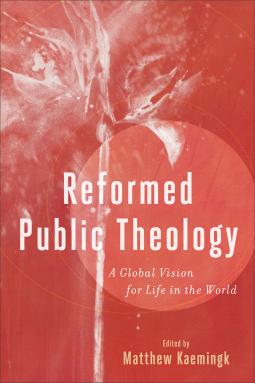
Reformed Public Theology
A Global Vision for Life in the World
by Matthew Kaemingk, ed.
This title was previously available on NetGalley and is now archived.
Send NetGalley books directly to your Kindle or Kindle app
1
To read on a Kindle or Kindle app, please add kindle@netgalley.com as an approved email address to receive files in your Amazon account. Click here for step-by-step instructions.
2
Also find your Kindle email address within your Amazon account, and enter it here.
Pub Date 17 Aug 2021 | Archive Date 15 Oct 2021
Baker Academic & Brazos Press | Baker Academic
Talking about this book? Use #ReformedPublicTheology #NetGalley. More hashtag tips!
Description
Available Editions
| EDITION | Other Format |
| ISBN | 9781540961976 |
| PRICE | US$29.99 (USD) |
| PAGES | 336 |
Featured Reviews
 Reviewer 631651
Reviewer 631651
The church's burgeoning need for this book in 2021 cannot be overstated. Kaemingk et al has delivered a masterpiece for which I am most grateful. In this literary treasure, various topics of theological import meet the intersection of daily life, riddled with new and emerging needs of social and cultural exposition that must be viewed through a biblical framework or lens. This book accomplishes just that.
When it comes to "Reformed" theology, I think a lot of people, myself included, typically engage with caricatures compared to the real deal. This is not to say the Reformed tradition is perfect; far from it. Rather, if one was to read "Reformed Public Theology," they would definitely walk away with a more holistic view of the tradition. In fact, what I was most impressed by is how all of these writers and scholars managed to engage with such important issues, such as euthanasia/quality of life, poetry, fashion, urban planning, the list goes on and on.
However, this is also a critique I have of the book: there are a handful of engaging and provoking ideas being presented, especially in regards to the aforementioned topics, but it all simply feels like a taster. For example, regarding the CRT essay: this is the one I was looking forward to the most, yet I walked away feeling like it was underbaked. It's possible if the author was given more time and space, the argument would feel more compelling, but as it sits, I don't feel as if all of the authors utilized this format as much as they could have.
If only for the fact this book could help inspire people to think differently about Reformed thinkers and theology, especially in regards to what place it has in the day-to-day, I'd recommend it. Again, there are some stellar essays. By and large, however, there were more pieces that left me wanting more negatively (as in, the arguments failed to land for me) compared to positively (that is, I wanted to read a book by the author on the topic ASAP).
 Steve B, Reviewer
Steve B, Reviewer
In Reformed Public Theology Kaemingk has done a tremendous job in assembling a diverse range of scholars who contribute on such a wide scope of topics. Despite the geographical, racial, and gender differences the common thread is that they all write from a Reformed perspective and draw upon the insights of Calvin, Kuyper, and Bavinck in particular. The book is also fittingly a festschrift for Richard Mouw. In his Introduction Kaemingk summarises the aim of the book:
This book is specifically designed to serve as a “taste and see” introduction to a variety of select ways in which Reformed theology and public life intersect.
The book is split into four parts: Public Culture, Public Markets, Public Justice, and Public Aesthetics – and Kuyper and his works appear in all parts. By my reckoning, we have 75 mentions of common grace, 21 for sphere sovereignty, but only 6 for antithesis. Calvin has 424 mentions, 205 for Kuyper, and 139 for Bavinck. These mentions far outweigh those of other Reformed scholars.
The book will be a go-to for anyone interested in the interaction of public theology and the Reformed, especially the Kuyperian tradition.
This review will be published in "Kuyperania 2021" Koers: Bulletin for Christian Scholarship



